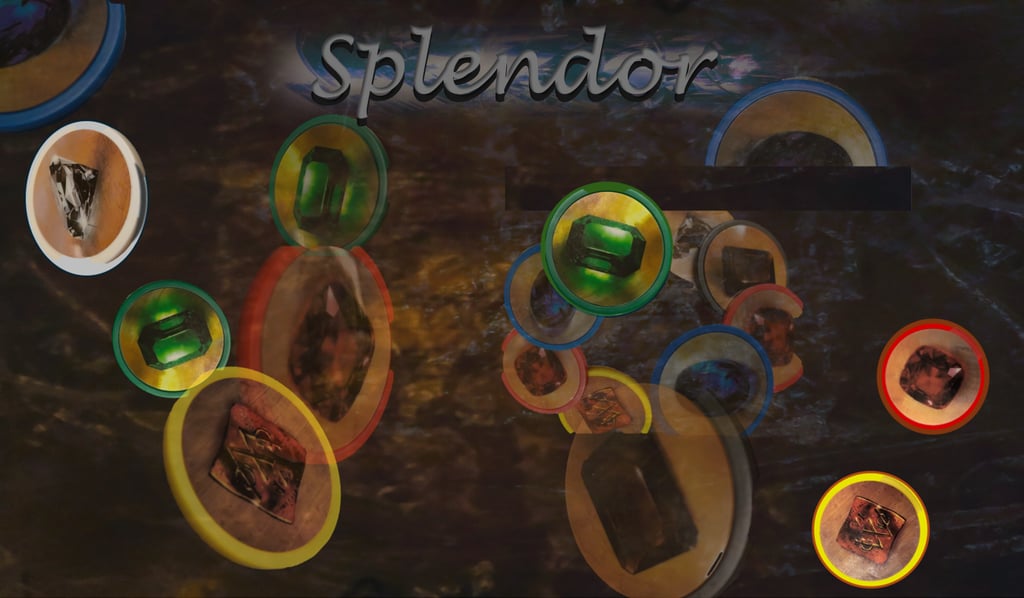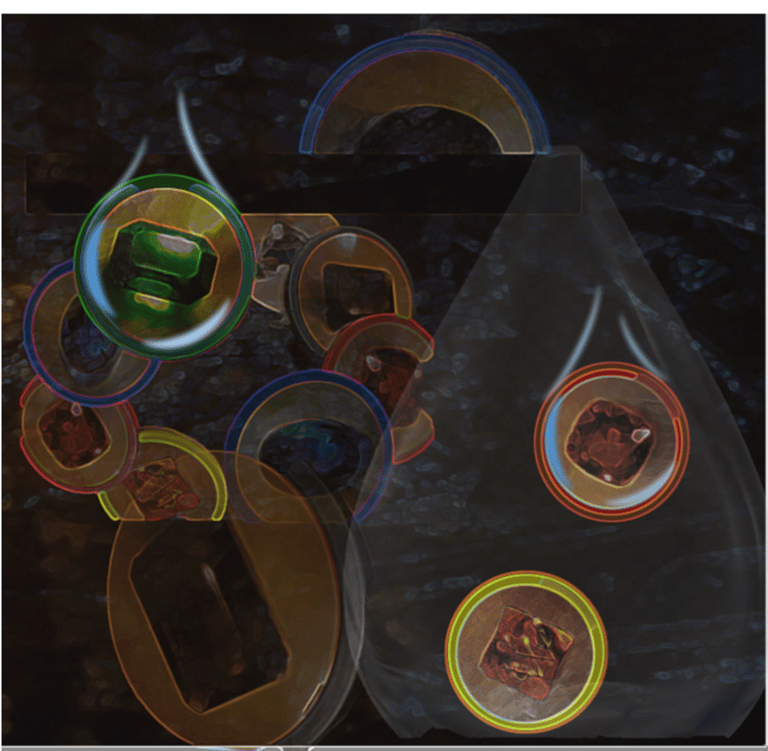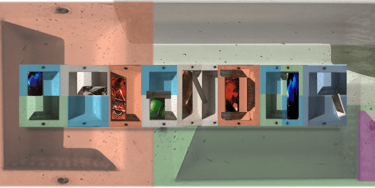
Engine Smoothie
A review of Splendor
Chris Sanderson


Unboxing Splendor was a bit like being served in a posh 'haute cuisine' restaurant. With a flourish, the waiter pulls the silver cover off the platter and - voilà! A miniature portion of token slices and a batch of cards, all encrusted in a bulky helping of black plastic.
A minimalist boardgaming delicacy.
Was that it? A couple packets of tokens with a wad of cards set in an excess of plasticky blackness? Honestly, this seemed more fish eggs than caviar. Lucky I'd got the game on offer, so I wasn't overly scandalized.
Still, I needed convincing I'd made a good investment. And, to my relief, conviction soon came. I quickly realised there was a lot more to Splendor beyond the aircraft hangar-sized box. Since then, I've been busy unpacking all that empty space - and I can say the game's interior void is worth the money.
That 'void' is kind of what makes the game shine.
Sounds weird, but those gems thrive in that empty space. Being drowned in black plasticky vastness seems to suit them. They almost shimmer against their night-sky backdrop.
OK, so I'm not defending the size of the box (I actually got rid of mine), but it seems kind of poetic - or atomic? - that so much excess space should contain such a powerful game nucleus. No board, no dice, no predictable microcosmic medieval world; just a bunch of glittering gems begging me to string them together in delicious, colour-comboed chains to win plush cards. Cool, uncluttered, incisive. That's Splendor.
I love how this game makes no attempt to impress, explain itself or seduce with an excess of dressing. It dares to serve me a half-empty plate, and that's fine. A modest bunch of rubies and sapphires will be more than enough to start threading enticing pathways right across the tableau.
Pathways? Yes, that's how I often see it. Okay, you've got the mines-workshop-jewellers progression in the card art, but I go further. I'm in my shire, perusing Mordor in that distant third row, as I wager on a noble's (ranger's?) influence to thrust me towards my destiny. Sounds too Tolkienian? Okay, then, let's say I'm Candy-Crushing chill arctic diamonds with earthy onyx, resonating elastic colours with a mellisonant hum, till gems line up and - splash! - I get my candy card thrill. (The only things missing are those yummy sound effects.)
These are my contexts. What are yours? Shall we share? I'll let you borrow my nobles, for instance. You'll like them. They can be Middle-earth elves or rangers, or even milestones or warp-drive boosters - whatever you wish. Who even looks at those guys anyway?


Seriously, I'm beginning to wonder if Splendor has a kind of psychoanalysis-test element more than a game context. It places you in an empty room with a pile of gem tokens and cards, then leans back in its chair, steeples its fingers and observes you over the rims of its spectacles. What will you do? How will you construct, and what will that reveal about the real inner you?
Me, it reveals my secret, fierce passion for engine-tinkering.
Yes, must be the repressed model railway enthusiast in me. Drooling over cerebral steam locomotive designs and quaint mechanisms must be my thing. I'm clearly a dabbler in purring crystalline machines whose cogs don't grind, whose levers don't shudder and whose oil never leaks.
Because that's the type of engine I get from Splendor.
Oh, you can get sleeker, more hyped-up engines in other games. But wouldn't you expect that type of advancement from building on a prototype? Even as a kind of 'prototype' engine-builder, though, Splendor gets some flak. Some compare it disparagingly to other more sophisticated games that have come after it. Hmm, isn't that like knocking Da Vinci for not inventing jet propulsion? I'm truly sorry, Splendor, that your creator didn't think to fit you out for terraforming planets. A glaring oversight, that.
Another common gripe is it's too multiplayer solitaire, that I'm only looking at my stuff and ignoring everyone else's.
I don't understand that one. How can you afford to ignore what other players are doing? The action of reserving a card makes little sense other than preempting an opponent from taking it. You can see their cards and gems lining up to go for certain things. Splendor is so lucid, so uncluttered like that. Everything is out there on the table. Why not read the signs?
It's that quartz-like transparency of Splendor that hooks me in. No illusion here, no sleight of hand. The game is a gem in itself, with its understated charm, its shapely, angled handles and its smart choices. Do you go for a triple-gem safety-net investment? Or a double-gem homing-in deal? Or a longer-view card reservation for that joker gem bonus and a bit of stalling your opponent? Crunchy choices indeed.
I'm sorry, impatient critics, that there is no nobility-led machiavellian drama, no Great Splendor Heist. Semi-themeless, it never pretends to be much more than a neat bunch of mechanisms. But the cutting edge is there. I feel how it activates the sharp dealer in me, sets him buzzing to a glittering world of poker-chip gems. Yes, Splendor is solid proof that a game doesn't need to attempt to be a complex simulation of something to have a fine edge of realism.
And, besides, in the end aren't games just supposed to be ... fun? This one sure is. With its soft clinking of chips and the gentle sliding of cards in and out of rows, it's a delicious engine smoothie to end the day.
No, I won't call it fish eggs. This is pure caviar, my friend.


Find this review in BoardGameGeek.
Hi, I am Chris Sanderson, an Englishman living near Madrid, Spain. Please send me your comments by email, or in BoardGameGeek through the links at the end of each game review.
© 2026. All rights reserved.